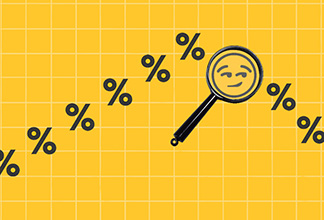How Canada’s Interest Rate Cut Could Impact You: RBC Strategist’s Take
Written by The Inspired Investor Team | Published on June 6, 2024
Written by The Inspired Investor Team | Published on June 6, 2024
The Bank of Canada (BoC) has ended months of speculation over whether they would cut interest rates by reducing the overnight rate to 4.75 per cent – a drop of 25 basis points. This was the first cut since the BoC started raising rates in March 2022 to try and tamp down rising inflation.
Now, with prices increasing at a slower annual pace than a year ago, rising unemployment and weaker economic growth, the central bank had the green light to cut rates, says Eric Savoie, an Investment Strategist with RBC Global Asset Management.
“It was appropriate for the central bank to deliver some sort of interest rate relief, especially considering that changes in monetary policy tend to take some time to work their way through,” he explains.
With the BoC being the first of the G7 central banks to lower interest rates, what does it say about the health of the Canadian economy, what does it mean for investors and where do we go from here? Savoie weighs in on our questions:
What does this rate cut say about the health of the economy right now?
The rate cut signals that restrictive rates are no longer necessary because there’s been sufficient cooling in the economy to warrant a little bit of relief. That doesn’t necessarily mean the economy is in bad shape by any means, but it suggests it’s no longer overheating as it was for much of the past two years.
When there’s a shift from tight monetary policy to one of loosening financial conditions, it’s either because the economy is genuinely weak and about to fall into recession or the economy is continuing to move in the right direction and stocks generally respond well in that environment. It takes a couple of quarters to figure out which way things are going to go.
What could monetary easing (lower interest rates) mean for investors?
Generally, rate cuts can potentially be good for all asset classes as long as a recession is avoided. Longer duration, fixed-income assets tend to appreciate as rates fall when bond prices go up. For stocks, it depends on what happens with the economy. If the economy does avoid a recession, then the lower rates typically help boost stock market valuations and they deliver pretty good returns in that environment. But it’s not necessarily a great environment for short-duration fixed-income assets, so cash, for example, or GIC-like instruments.
We believe that investors should build portfolios that can handle all economic environments, and rates going up and coming down are all part of a natural economic cycle. A well-diversified portfolio should be able to withstand these conditions in the economy and do well over the very long term.
What do you think this means for consumers?
If you think of the interest rate as being sort of a hurdle to making decisions, the lower the rate, the lower the hurdle, which could then boost activity. One cut is unlikely to alter the picture substantially, but if we get a series of rate cuts, people start thinking about spending.
How do you think the Bank of Canada will approach future rate cuts?
We think it’s going to be a more gradual approach to rate cutting. If you were to compare this to other easing cycles in the past, our base case view for the economy is a soft landing, so that would argue for more of a modest easing cycle. After the most recent cut, we would expect one more cut by the end of the year and then two by the middle of next year. That could change if inflation asserts itself again, but if the economy really deteriorates from here, you could see them cutting even more aggressively.
Canada and the U.S. normally follow a similar path, but in the U.S. the expectation is for rates to remain unchanged, with some suggesting they could even rise. If Canada and the U.S. diverge on interest rate policy, what could that mean for investors?
If you continue to see divergence in economic data, then the Canadian sovereign bond market should outperform the U.S. bond market. Currency should also be impacted. You might see the Canadian dollar suffer in that environment and that creates a very tricky situation for the Bank of Canada.
In that environment, inflation pressures would probably reassert themselves as a weak currency tends to bring about higher inflation, but it’s rare for that situation to persist for more than two quarters. Still, we expect the U.S. to cut rates later this year, maybe in the fall or in the winter, and then two more cuts by this time next year.
Do the markets even care about rate cuts anymore?
It still matters. It comes down to why the rates are changing. If inflation is surging to higher levels, that tends to hurt stock valuations, because rates are going up to stop inflation. If rates are going up because economic growth is very strong, that’s a different situation. That tends to be okay for the stock market, because it means that earnings growth is going to be strong enough to withstand that higher cost of borrowing.
If rates are falling because inflation is under control, but the economy is okay, that’s a good thing. But they are falling because the economy is headed to recession, and the rates are desperately needed to revive the economy, that tends to be a negative indicator.
Find out more about What Happens To Stock and Bond Prices When Rates Fall?
RBC Direct Investing Inc. and Royal Bank of Canada are separate corporate entities which are affiliated. RBC Direct Investing Inc. is a wholly owned subsidiary of Royal Bank of Canada and is a Member of the Canadian Investment Regulatory Organization and the Canadian Investor Protection Fund. Royal Bank of Canada and certain of its issuers are related to RBC Direct Investing Inc. RBC Direct Investing Inc. does not provide investment advice or recommendations regarding the purchase or sale of any securities. Investors are responsible for their own investment decisions. RBC Direct Investing is a business name used by RBC Direct Investing Inc. ® / ™ Trademark(s) of Royal Bank of Canada. RBC and Royal Bank are registered trademarks of Royal Bank of Canada. Used under licence.
© Royal Bank of Canada 2024.
Any information, opinions or views provided in this document, including hyperlinks to the RBC Direct Investing Inc. website or the websites of its affiliates or third parties, are for your general information only, and are not intended to provide legal, investment, financial, accounting, tax or other professional advice. While information presented is believed to be factual and current, its accuracy is not guaranteed and it should not be regarded as a complete analysis of the subjects discussed. All expressions of opinion reflect the judgment of the author(s) as of the date of publication and are subject to change. No endorsement of any third parties or their advice, opinions, information, products or services is expressly given or implied by RBC Direct Investing Inc. or its affiliates. You should consult with your advisor before taking any action based upon the information contained in this document.
Furthermore, the products, services and securities referred to in this publication are only available in Canada and other jurisdictions where they may be legally offered for sale. Information available on the RBC Direct Investing website is intended for access by residents of Canada only, and should not be accessed from any jurisdiction outside Canada.

Investors can now focus on what a second Donald Trump presidency might look like

Dates, deadlines, announcements and more that self-directed investors need to know.

For the first time since November 2022, the BoC’s overnight rate is sitting at 3.75 per cent